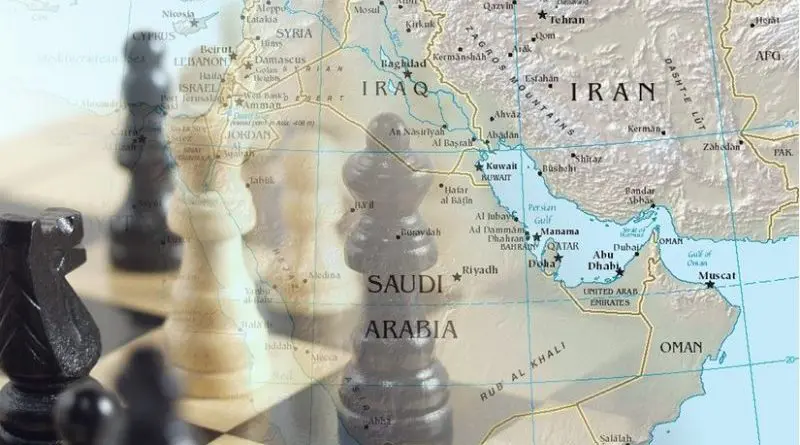Muddle Of Power Politics And Proliferation In Middle East – Analysis
In the perspective of the new great game, Western Asia/Middle East has emerged as a highly significant strategic constituent of the international political landscape. The complex calculus of Western Asia has affected the direction of integration, complexions of regional politics, sectarian crisis and nuclear non-proliferation. The contemporary interplay of regional and global security dynamics pertaining are destabilizing the security domains of Middle East. The region is currently in the process of transformation and facing serious security challenges. The prevailing crisis in Yemen has diverted the world’s attention towards this region.
The crisis is undoubtedly much more complex than merely a Shiite-Sunni war, yet it is difficult to be understood without the Sunni-Shiite component. The airstrikes in Yemen launched by Sunni Arab countries of Arabian Peninsula, primarily Saudi Arabia to target Yemeni al-Houthis- a Shiite faction supported by Iran, is no coincidence in the contemporary scenario of Middle East.
Lately, the survival of Al-Asad government in Syria- historically supported by Russia and Iran, the success of pro-Iranian government in Iraq and the strength of Hezbollah in Lebanon has reinvigorated Iranian influence on Arabian Peninsula and shattered Riyad’s dominance in Arab World. Obviously, viewing these developments along the northern border, Saudi Arabia had to act on the possibility of an al-Houthi success establishing a pro-Iranian, Shiite state to its South as well. Thus, the ongoing warfare in Yemen is a complicated disarray of sectarian conflict and power politics in the Middle Eastern region.
Likewise, the Saudis military act in Yemen cannot be observed in disconnection to a US-Iranian nuclear deal. Evidently, US is focusing on an approach to ensure Balance of Power and blow sectarian divide in the region, as he previously supported Iranian-led Shiite in Iraq and now reportedly providing intelligence and mission planning to Saudi Arabia against pro-Iranian al-Houthis. US will not want Iran to acquire a nuclear weapon because Iran holds the conventional capability to target US and allied troops stationed in Middle Eastern region. Thus, the Iranian nuclear weapon developments would increase threat radically for US.
Whereas, if the Iran-US nuclear deal finalizes, the framework of deal would probably lead to lift sanctions from Iran, which may invigorate Iranian economy to assist their military or nuclear ambitions. These advancements might lead a nuclear arm race in the region, by primarily forcing Saudi Arabia to pursue such an option. Saudis have already warned that they would acquire the atomic bomb if Iran becomes a nuclear power. Recently, Riyadh signed a memo of understanding with Seoul to build two nuclear power plants, whereas similar projects have already been taken place with France, Argentina and China.
A while ago, US has lifted ban on military aid to Egypt while Egypt has also announced the plan to build its first nuclear power plant with Russian help on the Mediterranean coast west of the port city of Alexandria. Egypt is being considered as another Sunni state in region, emerging as an atomic proliferant state. United Arab Emirates (UAE) has way ahead started constructing its nuclear reactor. Whereas, Israel’s nuclear plans are widely known, Israel is a non-party state to NPT, already has a robust nuclear weapons stockpile in the region and is reportedly in quest of second strike capability.
Now almost all the major powers of Middle East including Saudi Arabia, Algeria, Turkey, Syria, Oman, UAE, Jordon, Morocco, Tunisia, Kuwait, Qatar and Egypt have either announced plans to produce nuclear energy or have signed nuclear cooperation accords. Yemen and Libya are the two states that have called off their nuclear programs. The predominant fear in region is that most of the states in region will join the nuclear arm race to secure themselves, following the Iran case or as result of ongoing regional power politics.
Conversely, the Yemen issue is affecting across the Middle East as the possibility of South Asian state becoming embroiled in Yemen’s civil war is high because Riyadh has been leaning on Pakistan to join its military coalition, whilst the reports of secret Pak-Saudi nuclear cooperation are already speculating. Thus, if Yemen conflict gets complicated and Houthi rebels extend their vigorous aggression inside Saudi territory, then in such worsening situation, Pakistan will be standing at a crossroad to decide about the level of its involvement in the conflict and scale of its cooperation with Saudi Arabia. Possibly, sighting the geopolitical calculus, a flat refusal would not be possible for Islamabad, while a direct involvement in Yemen will be taken as Saudi-led Sunni coalition arrayed against Iran that might ignite Pakistan-Iranian tensions and broader Shiite-Sunni conflict.
To conclude, few things are worrisome, like Saudi Arabia’s endorsement of the Geneva Deal between Iran and six-powers led by the United States is being widely considered ‘hesitant’ and the Saudi Regime is suspected to harbor ambitions to develop nuclear option in a future triangular regional power-politics among Saudi Arabia, Iran and Israel. Primarily, a nuclear arm race is likely to start in Middle East between Iran and Saudi Arabia like an arm race in South Asia between Pakistan and India. Moreover, the proxies of South Asian or other countries in Yemen conflict would plunge additional complexities.

